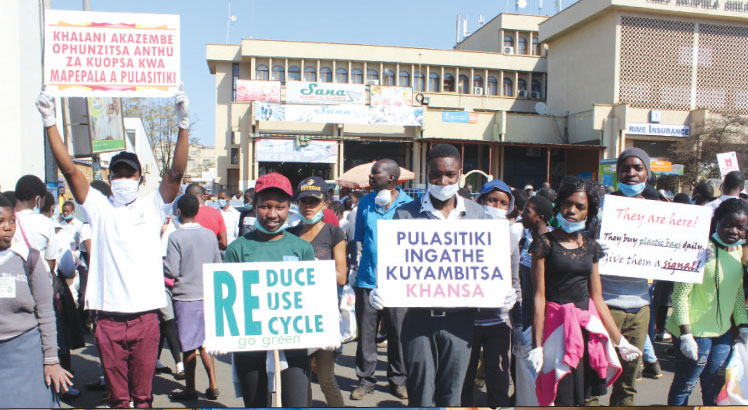Thin plastics case delay irks CSOs, to petition Judiciary
Twenty non-governmental organisations and civil society groups in the country have ganged up to present a petition to the Chief Justice Renzine Mzikamanda over delayed ruling on thin plastics case.
The petition is one of the activities to take place on Wednesday as Malawi joins the rest of the world in commemorating the 50th World Environment Day, which is focusing on solutions to plastic pollution.
The petitioners through Coordination of Union for the Rehabilitation of the Environment (Cure) Malawi executive director Reginald Mumba claim that efforts to regulate plastic pollution in Malawi have been hindered by injunctions obtained by those with business interests in the plastics industry who have no regard for the costs of their actions on the environment and the health of Malawians.
He said: “While we respect the right of access to justice for all, we lament the fact that the courts have, in this case, been used to deny access to justice for all those affected by plastic pollution now and in the future.

“More importantly, we are aggrieved by the time it has taken for the courts to deliver a ruling yet courts are meant to be accountable to the people they serve.”
In 2021, Golden Plastics Limited obtained a stay order restraining Malawi Environment Protection Authority (Mepa) from implementing the 2015 ban pending appeal in case where the company is challenging the government on provision of the Plastics Regulations (2015).
Part of the text in the CSOs’ petition reads: “Your Lordship, we, the undersigned civil society organisations, call upon your office to expedite the ruling of Civil Appeal No. 29 of 2021, ‘The State and Minister of Environmental Affairs and Attorney General exparte: Golden Plastics Limited, Malawi Supreme Court of Appeal.
“It has been said that justice delayed is justice denied. May justice be seen to be done for Malawi, for all Malawians and the planet.”
Golden Plastics is not the first company to move the courts on the plastics ban but most of the multiple rounds of private sector engineered court battles were won by the government.
In an interview on Thursday, Centre for Environmental Policy and Advocacy (Cepa) executive director Herbert Mwalukomo said Malawi produces 75 000 tonnes of plastics every year and 80 percent cannot be recycled.
He said: “The statistic show the level of harm by thin plastics to the environment. These plastics are actually threatening human life apart from the environment itself; hence, need to be banned.”
Local think-tank on waste management, Waste Advisers director of programmes John Chome said in the absence of the thin plastics ban, plastic pollution will continue to worsen in the country.
“As a result this country is being inundated by plastics so it is a serious problem that needs to be dealt with,” he said.
Chome said studies that have been carried out in cities of Blantyre and Lilongwe show that 10 percent of all the waste that is produced is plastics.
Globally the United Nations Environment Programme (Unep) is coordinating efforts to develop an international legally binding instrument on plastic pollution, including in the marine environment.
Unep has also released a new report which states that plastic pollution could reduce by 80 percent by 2040 if countries and companies make deep policy and market shifts using existing technologies.
The organisations involved are Cure, Cepa, Churches Action in Relief and Development, Wildlife and Environmental Society of Malawi, Malawi Environmental Endowment Trust, Movement for Environmental Action, Waster Advisors and National Youth Network on Climate Change, among others.





